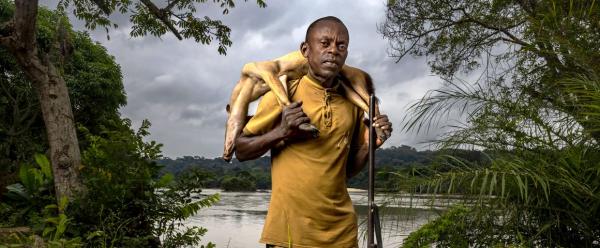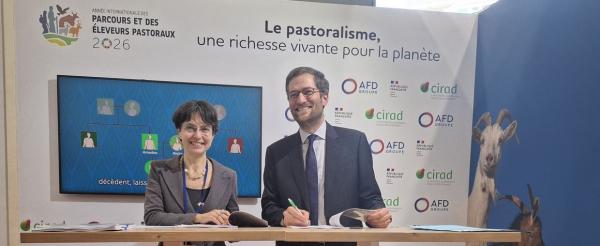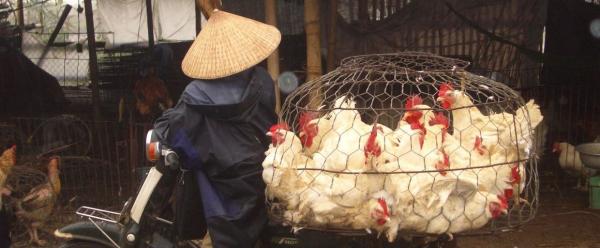The European Union (EU) has just allocated 25 million euros in additional funding to FAO, with a view to expanding and scaling up the Sustainable Wildlife Management Programme until May 2029.
Since 2017, the initiative has been working with African, Caribbean and Pacific countries to reduce unsustainable wildlife hunting, conserve wildlife, and strengthen people's livelihoods and food security.
The first phase of the initiative received €45 million from the EU, with co-funding from the French Global Environment Facility (FFEM) and French Development Agency (AFD).
In this new phase, FAO will continue to lead a consortium of partners, which includes the French Agricultural Research Centre for International Development (CIRAD), the Center for International Forestry Research (CIFOR) and the Wildlife Conservation Society (WCS).
In the Kavango-Zambezi region of southern Africa, where human-wildlife conflict is a serious threat to food security and conservation, efforts are under way to help people and wild animals co-exist, based on understanding and sound land-use planning. The development of community-led management plans and livelihood improvement initiatives is central to the Sustainable Wildlife Management (SWM) Programme’s work in this arid region, aimed at strengthening wildlife conservation and empowering rural communities.
“The SWM Programme has a significant contribution to make as we work towards a sustainable and food-secure world for all,” said Maria Helena Semedo, Deputy Director-General, FAO. “The initiative contributes to the implementation of the Kunming-Montreal Global Biodiversity Framework as well as to the "four betters" in the new FAO Strategic Framework 2022–2031. For example, the Programme is working towards “better nutrition” by promoting safe food across wild and domestic meat value chains, and towards “better environment” by developing innovative approaches to improve practices, build capacities to reduce zoonotic risks and protect ecosystems.”
Cooperation with more than 80 local communities in 16 countries
The partnership is working with national and regional administrations, and over 80 local and indigenous communities, in 16 countries. The initiative is strengthening innovative and collaborative targeted approaches to conserve wild animals, protect ecosystems, and improve the livelihoods of those who depend on these resources.
“Building scalable new models to conserve wildlife and improve food security takes time,” said Marjeta Jager, Deputy Director-General, Directorate-General for International Partnerships (DG-INTPA), European Commission. “We need to further develop the models tested by the SWM Programme and to disseminate and scale up the Programme’s findings, results and approaches to achieve greater impacts. For this reason, the European Union seeks to provide additional funding to continue the SWM Programme until June 2029.”
Sustainable, legal wildlife use
Many rural populations around the world continue to rely on wildlife for food, income and their cultural identity. Wild meat is an important source of protein, fat and micronutrients. However, the increasing demand for wild meat, especially in urban areas, is threatening wildlife populations, ecosystem balance, and food security of indigenous and rural communities in tropical and subtropical regions.
Moreover, the Covid-19 pandemic highlighted the interdependence between human, animal and ecosystem health, and illustrated the magnitude and diversity of the consequences that the loss or degradation of biodiversity can have around the world.
The SWM Programme aims to improve the sustainable and legal use of wild animal populations through participatory management of hunting, fishing and wildlife. It also works on reducing urban consumption of wild meat from unsustainable sources by encouraging healthy and sustainable livestock, poultry and fish farming value chains.
In Gabon’s Mulundi Department, where rural communities rely on wildlife for food security and income, a multi-disciplinary team coordinated by CIRAD is piloting an initiative to protect wild animals without compromising the traditional diets and livelihoods of local people. Rather than sanctioning communities for consuming wildmeat, the project is working with villagers and local hunters to develop practical tools to sustainably manage this rich resource.
The initiative focuses as well on building capacity to reduce zoonotic risks at the human-domestic animal-wildlife and ecosystem interfaces by promoting the One Health approach.
A contribution on a global scale
The new EU funding will be used to increase the impact and sustainability of the Programme by completing the models and sharing lessons learnt, tools and innovations at national, regional and international levels.
The initiative will continue to work with the Organisation of African, Caribbean and Pacific States and regional organizations in Africa.
The SWM Programme contributes to the FAO Strategic Framework 2022-2031, which supports the 2030 Agenda for Sustainable Development through a transition to more efficient, inclusive, resilient and sustainable agri-food systems that deliver improvements in production, nutrition, environment and livelihoods.
The Programme also contributes to many international strategies and priorities, including the Kunming-Montreal Global Biodiversity Framework, the One Health approach, and the Ramsar Convention on Wetlands of International Importance.
Source: FAO press release
At the SWM Programme sites in Gabon and Zimbabwe, CIRAD is implementing methods that put rural communities at the heart of sustainable wildlife management. These community-based approaches, backed by CIRAD's experience across all its worksites in the global South, are a major step towards achieving the goal of protecting 30% of land areas set out in the Kunming-Montreal Global Biodiversity Framework.
Elisabeth Claverie de Saint Martin
CIRAD CEO
-89.JPG)

























-486-recadre.jpg)



